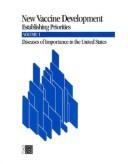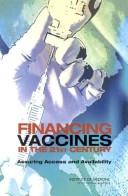| Listing 1 - 10 of 32 | << page >> |
Sort by
|
Book
ISBN: 9798216031628 9798216161356 1440843546 9781440843549 9781440843532 1440843538 Year: 2019 Publisher: Santa Barbara, California
Abstract | Keywords | Export | Availability | Bookmark
 Loading...
Loading...Choose an application
- Reference Manager
- EndNote
- RefWorks (Direct export to RefWorks)
Providing accurate, accessible information on vaccines and the controversies that surround them, this book outlines the history of vaccine regulation and interactions between vaccines and the immune system, and thoughtfully considers each vaccine debate. A part of Greenwood's Health and Medical Issues Today series, The Vaccine Debate provides a straightforward introduction to the interaction between vaccines and the immune system. The book documents the rise of the anti-vaccination movement, provides reasons for its prominence today, and explains the effects of vaccine refusal on public health. It also addresses concerns about the role of government in regulating vaccine production and administration, along with questions about vaccine safety. Additionally, a majority of the book examines in detail seven major vaccine controversies and mainstream medical positions on them. These controversies are given individual attention, with questions at the end of each to encourage critical thinking about such topics as the effectiveness of vaccines in protecting public health and whether vaccinations should be mandatory for public school attendance.
Book
ISBN: 0443134340 0443134332 9780443134333 9780443134340 Year: 2023 Publisher: London, United Kingdom ; San Diego, CA : Academic Press, an imprint of Elsevier,
Abstract | Keywords | Export | Availability | Bookmark
 Loading...
Loading...Choose an application
- Reference Manager
- EndNote
- RefWorks (Direct export to RefWorks)
"The coronavirus pandemic that began in 2019 brought to the fore the presence of a significant minority of individuals who strongly oppose vaccination. This opposition is by no means recent. Ever since the very first attempts to immunize individuals, opposition has been intense in some societies. The reasons for this opposition range from religious to political to medical. Although vaccines have eliminated smallpox and largely eliminated polio and measles, opposition to vaccination persists and, in some countries, has grown stronger.A History of Vaccines and Their Opponents seeks to describe the history of this opposition as well as its changing rationale over the years and in different societies. The discussion may ultimately provide some suggestions for reducing hesitancy in the future." --
Vaccination --- Vaccine hesitancy --- Vaccines --- History --- History. --- Anti-vaccination movement --- Vaccination Hesitancy --- Anti-Vaccination Movement --- history --- history.

ISBN: 0309036798 9786610221769 1280221763 030956820X 9780309568203 Year: 1986 Publisher: Washington, D.C. : National Academy Press,
Abstract | Keywords | Export | Availability | Bookmark
 Loading...
Loading...Choose an application
- Reference Manager
- EndNote
- RefWorks (Direct export to RefWorks)
Vaccination --- Vaccines --- Research --- Government policy. --- Communicable diseases --- Inoculation --- Preventive inoculation --- Biologicals --- Immunization --- Anti-vaccination movement --- Prevention
Book
ISBN: 9781620810675 1620810670 9781620810361 1620810360 Year: 2012 Publisher: [Hauppauge], N.Y. Nova Biomedical
Abstract | Keywords | Export | Availability | Bookmark
 Loading...
Loading...Choose an application
- Reference Manager
- EndNote
- RefWorks (Direct export to RefWorks)
Vaccination. --- Communicable diseases --- Inoculation --- Preventive inoculation --- Immunization --- Anti-vaccination movement --- Vaccination --- Prevention
Book
ISBN: 0128127546 0128127554 9780128127544 9780128127551 Year: 2022 Publisher: London, England : Academic Press,
Abstract | Keywords | Export | Availability | Bookmark
 Loading...
Loading...Choose an application
- Reference Manager
- EndNote
- RefWorks (Direct export to RefWorks)
A New History of Vaccines for Infectious Diseases: Immunization - Chance and Necessity covers the developments of vaccines and how they have obliterated many fatal diseases and infections over time. The book treads a neutral path but does not avoid discussion. As uncertainty in the outcome of vaccination can only be determined by experiment, the path to vaccine development has been scientifically complex because the immune system and the manner in which humans respond to infection is variable and complex. Finally, the book describes the risks and benefits of vaccines in a visibly objective manner.
Vaccination. --- Communicable diseases --- Inoculation --- Preventive inoculation --- Immunization --- Anti-vaccination movement --- Vaccination --- Prevention --- Vaccines --- History. --- history --- history.

ISBN: 1280116099 9786610116096 0309526191 9780309526197 9781280116094 6610116091 0309089794 9780309089791 0309133254 Year: 2004 Publisher: Washington, D.C. : National Academies Press,
Abstract | Keywords | Export | Availability | Bookmark
 Loading...
Loading...Choose an application
- Reference Manager
- EndNote
- RefWorks (Direct export to RefWorks)
Vaccination --- Vaccines --- Communicable diseases --- Inoculation --- Preventive inoculation --- Immunization --- Anti-vaccination movement --- Biologicals --- Planning. --- Economic aspects --- Government policy --- Prevention
Book
ISBN: 1479844276 9781479844272 9781479876938 1479876933 Year: 2016 Publisher: New York, NY
Abstract | Keywords | Export | Availability | Bookmark
 Loading...
Loading...Choose an application
- Reference Manager
- EndNote
- RefWorks (Direct export to RefWorks)
The so-called vaccine court is a small special court in the United States Court of Federal Claims that handles controversial claims that a vaccine has harmed someone. While vaccines in general are extremely safe and effective, some people still suffer severe vaccine reactions and bring their claims to vaccine court. In this court, lawyers, activists, judges, doctors, and scientists come together, sometimes arguing bitterly, trying to figure out whether a vaccine really caused a person’s medical problem. In Vaccine Court, Anna Kirkland draws on the trials of the vaccine court to explore how legal institutions resolve complex scientific questions. What are vaccine injuries, and how do we come to recognize them? What does it mean to transform these questions into a legal problem and funnel them through a special national vaccine court, as we do in the U.S.? What does justice require for vaccine injury claims, and how can we deliver it? These are highly contested questions, and the terms in which they have been debated over the last forty years are highly revealing of deeper fissures in our society over motherhood, community, health, harm, and trust in authority. While many scholars argue that it’s foolish to let judges and lawyers decide medical claims about vaccines, Kirkland argues that our political and legal response to vaccine injury claims shows how well legal institutions can handle specialized scientific matters. Vaccine Court is an accessible and thorough account of what the vaccine court is, why we have it, and what it does.
Vaccination --- Communicable diseases --- Inoculation --- Preventive inoculation --- Immunization --- Anti-vaccination movement --- Law and legislation --- Political aspects --- Prevention --- United States.
Book
ISBN: 9791037029928 Year: 2023 Publisher: Hermann
Abstract | Keywords | Export | Availability | Bookmark
 Loading...
Loading...Choose an application
- Reference Manager
- EndNote
- RefWorks (Direct export to RefWorks)
"Avant la pandémie de Covid-19, l'Organisation mondiale de la santé (OMS) avait placé le refus vaccinal au rang de l'une des trois plus grandes urgences de santé publique mondiale. L'OMS a constaté une chute régulière de la couverture vaccinale contre la rougeole et une recrudescence des épidémies dans le monde. Dans le même temps, les sites Internet antivaccin ont proliféré et ont fait de nombreux adeptes en usant de désinformation et de théories du complot. Ces 'antivaccin', du parent au militant, se rejoignent sur un point: la peur des effets indésirables des vaccins. Plus spécifiquement, ils ont peur de voir leurs enfants développer une forme d'autisme à la suite de l'inoculation du vaccin. Cette croyance, à présent tenace, a pourtant une origine scientifique qui explique pourquoi elle s'est diffusée à ce point dans le monde entier et a fait le lit de la défiance actuelle d'une frange de la population vis-à-vis des vaccins anti-covid. Cet ouvrage vise donc à retracer la chaîne des événements qui a mené à cette catastrophe mondiale de santé publique. Afin de comprendre comment la science a pu alimenter nombre de fausses croyances sur la vaccination, les points de vue de scientifiques, de journalistes et de citoyens sont ici examinés tour à tour"--Page 4 of cover.
Vaccine hesitancy --- Anti-vaccination movement --- Vaccines --- Medicine, Preventive --- Mass media and scientists. --- Medicine in mass media. --- Misinformation. --- History. --- Social aspects.
Periodical
ISSN: 2287366X 22873651 Year: 2012 Publisher: Seoul : Korean Vaccine Society
Abstract | Keywords | Export | Availability | Bookmark
 Loading...
Loading...Choose an application
- Reference Manager
- EndNote
- RefWorks (Direct export to RefWorks)
Vaccines --- Vaccination --- Vaccines. --- Vaccination. --- Communicable diseases --- Inoculation --- Preventive inoculation --- Immunization, Active --- Active Immunization --- Active Immunizations --- Immunizations, Active --- Vaccinations --- Biologicals --- Immunization --- Anti-vaccination movement --- Prevention --- Vaccine --- Human medicine --- vaccinatie
Book
ISSN: 0070217X ISBN: 1280716703 9786610716708 3540365834 Year: 2006 Volume: 304 Publisher: Berlin ; [Great Britain] : Springer,
Abstract | Keywords | Export | Availability | Bookmark
 Loading...
Loading...Choose an application
- Reference Manager
- EndNote
- RefWorks (Direct export to RefWorks)
Mass immunization is the blitzkrieg of vaccination practice. It serves to rapidly protect populations, both because of the high coverage achieved and because of the herd immunity thereby induced. However, as in war, mass immunization campaigns must be conducted intelligently, with careful strategy and strong attention to logistics of supply and deployment. If conducted badly, mass immunization may fail or even be counter-productive. In this volume, some of the most successful practitioners of mass im- nization tell us about its art and science. David Heymann and Bruce Aylward of WHO begin the book with a theoretical and practical overview of mass immunization. Michael Lane, who participated in the successful effort to eradicate smallpox relates how this was done using mass vaccination and other strategies. Application of mass immunization by the US military is c- ered by John Grabenstein and Remington Nevin, who have a large experience in these matters. Karen Noakes and David Salisbury recount the striking s- cesses of mass immunization in the United Kingdom. The global control of the clostridia that produce diphtheria toxin is described by Charles Vitek. Hepa- tis A is decreasing dramatically under the impact of large-scale vaccination, as Francis André illustrates. The French experience with Hepatitis B vac- nation has been mixed, and François Denis and Daniel Levy-Bruhl explain the circumstances. In?uenza vaccination is an annual example of large-scale campaigns, the complexity of which is recounted by Benjamin Schwartz and Pascale Wortley.
Vaccination. --- Medicine, Preventive. --- Disease prevention --- Diseases --- Prevention of disease --- Preventive medicine --- Pathology --- Preventive health services --- Preventive medicine physicians --- Public health --- Communicable diseases --- Inoculation --- Preventive inoculation --- Immunization --- Anti-vaccination movement --- Prevention --- Vaccination --- Immunology. --- Immunobiology --- Life sciences --- Serology
| Listing 1 - 10 of 32 | << page >> |
Sort by
|

 Search
Search Feedback
Feedback About UniCat
About UniCat  Help
Help News
News